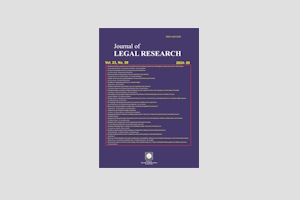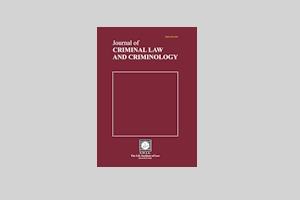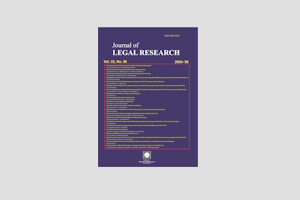Journal of
Criminal Law and Criminology
Number 2
Vol. I ● No. 2
Autumn2013 – Winter 2014
Managing Editor: Vahid Eshtiagh
Editor-in-Chief: Mohammad Ashoori
CONTENTS
Articles
The contexts of penal instrumentalism
Mohammad Jafar Habibzadeh, Hamed Rahmanian
Execution and recognition of foreign criminal judgments in Iran
Ali Khaleghi – Maedeh Mir Shams Shahshahani
Threat to non-cooperation with the ICC and Vague Future of Criminal Justice in the Africa
S.Ghassem Zamani
Criminal Liability of Govermental Legal Persons in Iran Legal system
Ghassem Mohammadi – Alireza Khanizadeh
Penal and civil effects of intervention in bankrupt trader assets
Hossein Simaei Sarraf – Mohammad khalil Salehi
The effect of custom on mental element of crime and factors of criminal responsibility deterioration
Mohsen Borhani – Atieh Parsaeian
Articles
The contexts of penal instrumentalism
Mohammad Jafar Habibzadeh
(Ph.D)
Hamed Rahmanian
(Ph.D student)
Abstract:
Penal instrumentalism means resorting to criminal matters as the most
accessible instrument to achieve any goals and goods for a quick and
easy resolution and relief of a problem, by ignoring the evident legal
and moral principles. In this essay for answering to what contexts reveal
the penal instrumentalism in the criminal policy systems, we numerate
two set of factors: first, theoretical contexts involving theoretical
foundations which, if will be accepted by criminal policy makers,
they will contextualize instrumental usage of criminal matters. Political
foundations, criminal policy models, and moral bases are embedded in
this category. Second, the practical contexts mean those facts and circumstances
which if exist, can actuate criminal policy makers, aside
from their theoretical foundations, to penal instrumentalism. Domination
of instrumental rationality and monologue in the public sphere,
power and authority relations, and finally individual characteristics of
criminal policy agents are embedded in this category.
Keywords:
Goal and mean, power, authority, moral, criminal policy model
Execution and recognition of foreign criminal judgments in Iran
Ali Khaleghi
(Associate Professor, Faculty of Law and Political Science, University of Tehran)
Maedeh Mir Shams Shahshahani
(Ph.D student)
Abstract:
Recognition of foreign criminal judgment is one of the methods of international
criminal cooperation. This method can be applied through
extradition, transfer of prisoners, execution of the sentences and cooperation
in criminal matters conventions. The recognition of foreign
criminal judgment had faced some challenges and restrictions from beginning,
and in Iran there are some religious restrictions, as well.
In this paper, the basis and one of the aspects of the recognition of the
foreign criminal judgments, that is, enforcement of foreign criminal
judgments and acceptance of their effects, and its importance in Iran
legal system will be discussed. It will be mentioned that, in this regard,
foreign criminal judgments are recognized in individual cases, and
when the recognition is required and useful for Islamic republic of Iran.
Keywords:
Validity of Foreign Judgments, Execution of Foreign Sentences, Effects
of Foreign Judgments, Transfer of Prisoners, Extradition, International
Cooperation.
Threat to non-cooperation with the ICC and Vague Future of Criminal Justice in the Africa
S. Ghassem Zamani
(Associate Professor, Faculty of Law and Political Science, University of Allameh-
Tabatabaee)
Abstract:
In July 2002, the Rome Statute of the International Criminal Court
came into force and International Criminal Court was established. It
was indeed a significant moment in international criminal justice. ICC
is a permanent institution and shall have the power to exercise its jurisdiction
over persons for the most serious crimes of international concern,”
which include “genocide; crimes against humanity; war crimes;
and the crime of aggression. The African region played a great and active
role in the founding of the Court. However, the fact that all accused
persons presently before the Court are Africans has raised speculation
that the ICC is targeting only Africans. This perception was further exacerbated
with the indictment of President Omar Al Bashir of Sudan.
Consequently, the African Union has resolved to cease cooperation
with the Court with regard to the arrest of Al Bashir. Therefore African
countries have come to be critical of the ICC and relations between
Africa and the court are currently severely strained. In fact, the African
Union has asked its members to implement a policy of non-compliance
and non-cooperation with the ICC. For the court to remain a credible
institution for the execution of international justice, the recent challenges
may be a great danger and should be taken seriously.
Keywords:
International Criminal Court, Criminal Justice, African Union, ICTY,
ICTR, Cooperation
Criminal Liability of Govermental Legal Persons in Iran Legal system
Ghassem Mohammadi
(Assistant professor of Beheshti University)
Alireza Khanizadeh
(Master of Criminal law and Criminology)
Abstract:
The silence of penal legislator on legal persons before the ratification
of the Islamic Penal Code in 2013, had led to absolute immunity of
legal persons from criminal liability in Iran legal system according to
the legal principles
However the law ratification opened the way of criminal liability of
governmental legal persons in the exercise of Policies in addition to the
criminal liability of the legal persons as a general theory.
This article explains the theory choice of legislator by criticizing the
first view.
Keywords:
legal person, criminal liability, principles of criminal liability, legal
person of public law, public legal person.
Penal and civil effects of intervention in bankrupt trader assets
Dr. Hossein Simaei Sarraf
(Associate professor of Beheshti University)
Dr. Mohammad khalil Salehi
(Associate professor of Qom University)
Abstract:
Iranian legislator to avoid deliberated damages to bankrupt creditors
have forbidden bankrupt trader to make out his assets of reach of creditors.
In otherwise, he is considered as fraudulent bankrupt. In addition,
intervention of third party or administrator (of assets) in bankrupt assets
has been considered as an offense. The civil effects of these criminal
intervention, is to restitution of property and compensate a loss and
finally annulations of a bargain.The Author`s efforts in this article is
the legal analysis of effects of third party and administration intervention
in bankrupt assets in according to third season of twelfth chapter
of Iranian trade law
Keywords:
intervention, bankrupt trader assets, criminal liability, legal liability
The effect of custom on mental element of crime and factors of criminal responsibility deterioration
Mohsen Borhani
(Assistant Professor, Faculty of Law and Political Science, University of Tehran)
Atieh Parsaeian
(Master of Criminal Law and Criminology, University of Tehran)
Abstract:
The principle of Legality leads to the fact that a significant number of
jurisprudents consider Custom as one of the guidance resources. The
analysis of Custom impact on legal concepts and inference of criminal
articles clarifies that custom should be taken into account in correct
understanding of law and it cannot be denied by lawyers and judges in
theory and practice.
This article shows that the mental element of crime and factors of criminal
responsibility deterioration are not based on abstract criterion. It
also determines Custom role on the above mentioned items. Since the
legislator does not define the legal factors of criminal articles, Custom
should come into discussion. Moreover public manners in society are
utilized as a Custom criterion in evaluation of mental factors leading
to criminal behavior. Thus, Custom is considered as a mandatory resource.
Keywords:
Custom, Mental element of crime, Criminal responsibility.





